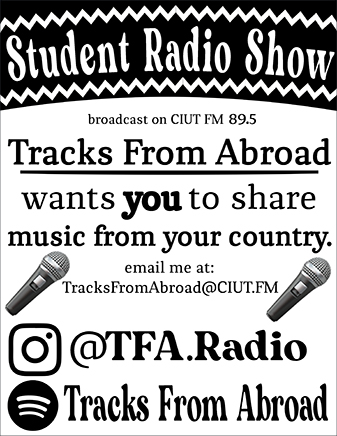Jesse McDougall is traveling around the world on U of T’s CIUT airwaves.
The third-year political science student and member of University College hosts Tracks From Abroad on CIUT 89.5 FM radio — a show he created.
Each week he interviews an international student attending U of T and invites them to share music from their home country, cultural insights and their experiences studying in Canada.
Currently airing Saturday mornings at 8 am, the program has been running on CIUT since last October with 18 shows to date, and every one of them has been a positive, eye-opening experience for McDougall who comes from a small town of 5,000 people in northern Vermont.
Since the show’s first broadcast, McDougall has interviewed students from Brazil, Iran, El Salvador, Latvia, Ghana, Haiti, Serbia and others.
“It works well because we have so many international students,” says McDougall. “They're eager not only to share about their home country and their music, but also why it's difficult to be an international student — you have the language barrier, you have to deal with visas, and you're simply far away from home.”

And for some students, there’s the added pressure of a family’s expectations because of the large investment in their education.
“Some of these students really have a tough road ahead of them,” says McDougall. “All of these things make the show interesting. But a big part is the music itself. They talk about why the music is important to them.”
While every show has at least one interview with an international student, occasionally, McDougall welcomes professors, alumni or local artists. A recent show featured Suzanna Ayash who currently lives in Lebanon and happens to be McDougall’s TA for an economics course.
“We were able to talk about the Lebanese economy and the country’s political tensions says McDougall. Later in that show, I interviewed a band that plays locally in Toronto. One of its members is Lebanese, another is Syrian, so the whole show was on Lebanon and Syria.”
Because of the pandemic, McDougall conducts most of the interviews remotely, sometimes traveling to the student’s home or residence equipped with a recorder and microphone. Or they also take place over Zoom, with students providing McDougall with a playlist of their favourite music.
“Because it's not live, I can edit the show afterward,” he says. “During the show, they might say ‘this song reminds me of a festival’ and then we'll transition into that song. I’ll add some songs made by Canadian immigrants, so we end up with a mixture of international music that also has a local connection.”
While every show is a unique experience, some leave a lasting impression.
I love being able to meet students I wouldn't meet normally, and the show enables me to make amazing connections within our community and the city. Toronto has neighbourhoods filled with people from all over the world, and through the show, I'm able to connect with, and understand, this city more deeply.
McDougall especially enjoyed learning about Saint Lucia through international relations student, Charran Auguste, and Kevin Edmonds, an assistant professor with the Department of Political Science and acting director of New College’s Caribbean Studies program.
They shared what’s behind the façade of the island’s glamourous tourism industry, with populations struggling in sectors like agriculture and trade, leading to political conflict and problems with crime and drugs that most tourists never see.
McDougall also enjoyed hearing ‘Dennery segment’ music. That’s a style of Soca music — a modern iteration of calypso music that originated in Trinidad and Tobago in the 1970s — developed in Saint Lucia in the early 2010s that features aggressive drums and a fast beat that’s always above 140 beats per minute.
And recently, McDougall spoke with aerospace engineering student, Henrik Friisø, who grew up in Nicaragua before moving to Norway where he shifted from beach life to skiing. He carries four passports, and brought with him music from both countries, while discussing racism, the Olympics and the Eurovision Song Contest.
Radio isn't dying
Amid the ever-expanding universe of playlists and podcasts, McDougall insists that radio isn’t dying. In fact, he sees a bright future for the University’s radio station as well as for Tracks From Abroad.
“CIUT just passed its 35th anniversary on the air,” says McDougall. “And I think we're about to see a strong period for CIUT. We're acquiring new hosts, new talent and we're always looking for students to join, so I wouldn't be surprised if in years to come a lot more students are creating shows.
“And I want Tracks From Aboard to have a legacy at U of T,” he adds. “I'm hoping this show can be passed on after I graduate.”
One encouraging sign — Tracks From Abroad recently received a grant from U of T’s Division of Student Life to fund a new show website to better support and promote the show in the future.
In the meantime, McDougall is loving being host and connecting with students globally as well as locally.
“I love being able to meet students I wouldn't meet normally, and the show enables me to make amazing connections within our community and the city,” he says. “Toronto has neighbourhoods filled with people from all over the world, and through the show, I'm able to connect with, and understand, this city more deeply.”
This stronger connection fuels his motivation to hunt for that next guest, be it a student, faculty member or alumni — and he encourages international students to contact him at TracksFromAbroad@CIUT.FM.
“There will always be international students with stories to tell, and new music to hear from around the world. I may even reach out to other universities to encourage them to start shows like mine to bring new music and perspectives to their campus.”

